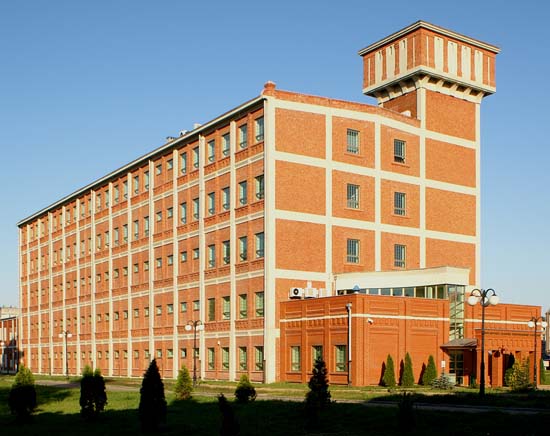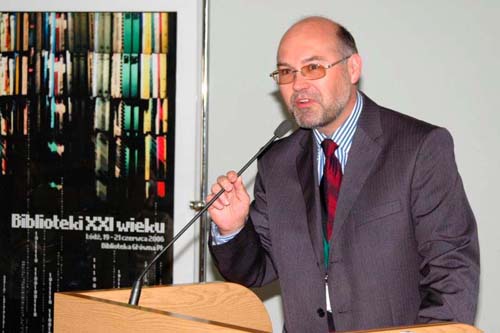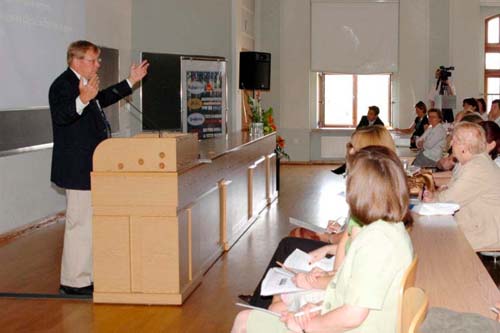Second Library Conference Organized at the Library of the Technical University of Łódź: Some Perspectives in Poland
Błażej Feret and Elżbieta Rożniakowska
The Library of the Technical University of Łódź (TUL) (see Figure 1) fulfills its functions as the academic library and information centre in one of the largest and the best technical universities in Poland. The library is located in a former XIXth Century factory building, renovated along with many others in the area by the TUL. It is equipped in a very modern way, and information services are of the highest standards.

Figure 1: The Library of the Technical University of Łódź.
In such an environment, where the spirit of history is being linked with the present time, on 19–21 June 2006 the Library held a conference on the future of the libraries. Its main theme was defined as: Libraries of the 21st century. Will we survive? The conference gathered more than 100 Polish librarians together with the invited guests from abroad: Di Martin — University of Hertfordshire, U.K.; Nancy R. John – University of Illinois at Chicago, U.S.; Edward J. Valauskas — Dominican University, U.S.; Maria Anna Jankowska – University of Idaho, U.S.; Andreas Knobelsdorf — Universitätsbibliothek Leipzig, Germany. Among Polish participants there were directors of the biggest academic libraries, representatives of Polish study of science and library science, newspaper reporters, and politicians.
Even before the conference, the conference theme caused such great interest that the program committee had to move several paper submissions to a specially arranged poster session, which originally was not intended. However, the majority of papers were presented at the plenary sessions. The authors of the papers ranged from young people, just starting their careers and making their scholarly debut at this conference, to librarians with long experience in library and education work. Such a diversity of authors shows that most librarians, regardless of their age, professional and scientific experience, are interested in the future of libraries. It is also evidence of recognition of the important role played by the TUL library itself, and for the quality of the conferences it organizes [1].
Conference papers were divided into seven groups and presented at plenary sessions. They were as follows:
- The past and the future — Reflections and visions
- Role of the libraries in the changing reality
- Modern library management
- Librarian in the library of the future
- Expectations of the digital library users
- Digital libraries — Development trends
- Internet in library — threat or helpful tool in librarian’s work
Apart from the plenary sessions, the poster session was organized with 13 posters presented in five groups (Databases and services, The Internet, Modernization in libraries, Transformation of the profession, The role of the scientific library in the changing reality).

Figure 2: Director Błażej Feret welcomes attendees
to the Libraries of the 21st century conference.
At first glance, it seems that these are the advances in technology, mainly in information and telecommunication, that will have the most significant impact on the development of libraries. Faster and faster processors, hard discs with greater capacity, miniaturization, more effective and elaborated software, electronic paper, e–books, Internet blogs and wikis as well as learning objects, library robots, digitization, mobile phones — they all enter library life whether we want them or not. However, regardless of the librarians’ wishes, they must be used in the library because such are the users’ expectations or even demands. Many times the following reflection appeared in the papers: that not only are the new technologies a threat to libraries, but also society and social changes occurring around us are not supportive of libraries, at least in the shape we know them. Speaking about survival, we must also speak about people, about understanding our users (personalization of services, library facilities, new services) and about transformations of librarians themselves. We should think about libraries not only as repositories, but also as places encouraging intense communication (scientific, social and interpersonal), which results in producing knowledge and culture. It is necessary to think about new organization of libraries, a new role for the librarian and changes in policies.
Worth mentioning in greater detail is the paper (in English) by Di Martin, University of Hertfordshire, who accurately indicated aims, features and factors of the library development. When speaking about transformation of the libraries, we must think about: understanding the user, proper collections, facilitation of the study processes, managing resources, and training librarians. Information everywhere and every time, easily accessible, personalized supplemented with safety and privacy is the characteristic of modern information services.
Lidia Szczyglowska from the Main Library of the Technical University of Czestochowa presented an interesting paper on the process of the library evolution (“‘Cybrary’ is still the Library”). Her paper was an attempt to show a structural overview of the evolution of existing academic libraries and some challenges that this process brings to librarians. Library space, functions and services have been reconfigured towards the hybrid library, which by some is perceived as just a stage in natural adaptation to a changing environment, while by others is seen as only a survival strategy. Some also note that the library of the future is no longer simply a monastery full of books and journals but also an “information marketplace” competing for customers.
Social problems were also presented in a very interesting paper, “The Role of the Library in the Process of Social Exclusion and Inclusion” by Wanda Pindlowa from the Jagiellonian University in Krakow. The aim of the paper was to show different groups of people who are excluded from the society, also by libraries and their regulations, due to various reasons. For example, some libraries exclude homeless or poor people who cannot pay for the lost books or for other reasons. At the same time, libraries can help people with the process of social inclusion, for example, by providing information for the unemployed, conducting distance learning, organizing training in the use of information technology, digitizing library resources to make them accessible remotely, etc. Future libraries should concentrate more on inclusion of those currently excluded from the information flow and from the society.
An interesting discussion by librarians about library specific problems was carried out by Jadwiga Woźniak–Kasperek and Małgorzata Kisilowska in the paper titled “Is there a future for cataloguing?” The text refers to cataloguing as a method of organizing knowledge and perceiving the world. It confirmed the necessity of maintaining this process in libraries and information centres. However, its optimization in regard to information needs and competencies of the users should be emphasized, because offering users individualized searching capabilities requires improvement of information retrieval tools. There is also a question of the objectiveness of library catalogues, for example, in light of the cultural differences among the users and information professionals. The paper presented the author’s views concerning the future of subject cataloguing and aimed to answer two questions: what are the pros and cons of subject headings systems? Is this the relevant time to announce the end of controlled indexing and indexing vocabularies?
Addressing problems connected with management, the paper presented by a young librarian, Bożena Jaskowska, related to participation of library staff in academic library management: “Empowerment and Partnership — Is It Possible in the Academic Library?”. As the title suggests, the paper presents the idea of empowerment and partnership in the academic library. Some differences between classical and empowerment management and a few of the most important features of leadership were also pointed out. Difficulties as well as benefits of staff participation in academic library management were also discussed in the paper. The author concludes that there are many areas in the academic library where empowerment and partnership could be successfully implemented in the management process.
A series of papers on electronics and digitization had quite a technological or technolibrarian nature. They tried to analyze whether or not, or how to digitize and whether it is a technology of the future that will supersede paper books. Particularly worth mentioning is the paper by Edward J. Valauskas (see Figure 3), “The Googlization of libraries: Future trends in librarianship.” The author mentioned a role and perspectives for digitization of publications, and discussed the role for Google in addressing all the legal intellectual property issues involved in digitizing. He also paid attention to the process of the Google “invasion” in libraries; libraries are understanding that along with the increased digital content available has grown the importance of personal and diverse services for their patrons. A new kind of librarian will come into existence: information mechanics, library avatars in virtual worlds, digital publishers, mash–uppers or digital archivists of new media. And although some express the opinion that Google and digitization are a waste of money, many young people think otherwise. One can say that the digital book will never replace paper books and journals. In fact, digital publication stimulate sales of paper ones. Therefore libraries should organize themselves to create their own large–scale open digitization projects and by means of new technologies, should preserve older publications. A vital role is played by open access, a good example of which is the World Libraries online journal. The author at the end of his lecture concluded: “Why not digitize, and have a library, too?”

Figure 3: Edward Valauskas talks about Google and libraries.
A similar idea was further developed by E. Kołodzińska and H. Ganińska in their paper, “A Vision of the Virtual Library as a Strategy for the Library of Technical University,” in which the authors described the present–day understanding of the virtual and hybrid library, describe virtual library components like networks, information and communication technology (ICT), online catalogues, resources, the library portal as virtual library centre, etc.
An answer to the issues concerning users’ information requirements was proposed by Maria A. Jankowska in the paper, “Users’ Information Needs in Academic Libraries of the 21st Century: LibQUAL+TM as a tool for assessment of service quality standards.” The author summarised her paper in the following way: Google Scholar, Amazon.com, Flickr, MySpace, social networking, open access, and easy retrieval of electronic resources and services create higher user expectations toward academic library collections and services. In this competitive environment of content providers and users’ growing expectations, academic libraries face a difficult task in providing the most satisfying ways of delivering content and services to their patrons. To what extent should libraries recognize users’ information needs in the area of services and collections? Is it possible for libraries to fulfil users’ growing needs toward libraries collections and services? In searching for answers to these questions the paper presents the LibQUAL+TM survey results that help to determine users’ satisfaction and expectations for quality library service. Assessment of service quality standards by library users is becoming a crucial element in future developments taking place in academic libraries. These developments will influence not only the form of existing services and collections but also will create demand for new organizational and library space and structure, cooperation and new integrated services and collections to fulfil educational and research universities’ missions.
The participants summarized problems presented at the conference with the following conclusions:
Libraries cannot aim only at their survival, which will mean social and cultural death. They are able and should change themselves along with the changing society proving to be places of learning and creativity, and along with the changing technologies.
Libraries should change themselves in such a way that one can say about library development, that it integrates the library with education, research and culture, or otherwise: an immersion into the structure of these worlds.
Libraries should not be afraid of novelties and trends, but instead should understand them and choose those what improve library practice and make it more effective (also more economical).
Libraries should act wisely and make decisions with thoughtful attention to their roles and missions, not to fall into chaos in the jungle of offers and proposals.
Libraries (especially Polish libraries) should not only benefit from the experience of libraries in the developed countries, but also aim at being an integral part of the world network of libraries.
A broad discussion is necessary and a successive transformation in library management, including library organizational structures, is needed in order to create hybrid libraries in accordance with a new model of the library and librarianship coming into existence and caused by:
- digitization
- new kinds of library services
- Google/Amazon technologies
- other multi–search engines
- personalized information tools
Sponsored presentations confirm that the commercial market offers addressed to libraries has become more and more intense. We still should learn how and to what extent we can make use of these offers.
It is necessary for the library (as an institution and a team) to be a learning and teaching organization continuously and to work out effective educational programs directed to the information needs of the users.
A well–functioning library requires constant and comprehensive studies of its effectiveness based on the surveys of:
- Users’ satisfaction
- Use of electronic resources
The users’ opinions and data relating to the quantity and quality of visits — virtual or traditional — will have an impact on the picture of the 21st century library.
All conference sessions were transmitted live online via the Internet, thanks to the sponsorship of the Lodz Metropolitan Area Network (LODMAN). Archives of transmissions are available at: http://live.man.lodz.pl/archiwum/31. The conference Web site in English and Polish is http://bg.p.lodz.pl/konferencja2006/index_eng.htm.
Conference participants had a full choice of interesting cultural, culinary and architectural events. These attractions were opportunities for the participants to relax after long and intensive conference sessions. Organization of the conference for nearly 200 people has been also possible thanks to the support of the sponsors. The biggest of them were: the City of Łódź Office, CSA, RefWorks, Sirsi Dynix, LODMAN, EBSCO, Knovel, AKME, Potronics–Łódź, ProQuest and Forster Polska. The success of the 2004 and 2006 conferences have encouraged the organizing committee to continue the series at the Library of the Technical University of Lodz with the next one planned for 2008.
Feret and Rożniakowska
Note
1. Another important conference, which became the first in a series, was the one organized in that library two years ago titled Polish Academic Libraries in the European Union, Łódź, 23–25 June 2004.
About the authors
Błażej Feret (see Figure 2) is Director at the Library of the Technical University of Łódź, Poland. Address: 223 Wolczanska Street, 90–924 Łódź, Poland. Tel. +48 42 6312059, Fax: +48 42 6363165.
E–mail: Blazej [dot] Feret [at] sunlib [dot] p [dot] lodz [dot] pl
Elżbieta Rożniakowska is Deputy Director at the Library of the Technical University of Łódź, Poland. Address: 223 Wolczanska Street, 90–924 Łódź, Poland. Tel. +48 42 6312057, Fax: +48 42 6363165.
E–mail: Elzbieta [dot] Rozniakowska [at] bg [dot] p [dot] lodz [dot] pl
© 2008 Błażej Feret and Elżbieta Rożniakowska.